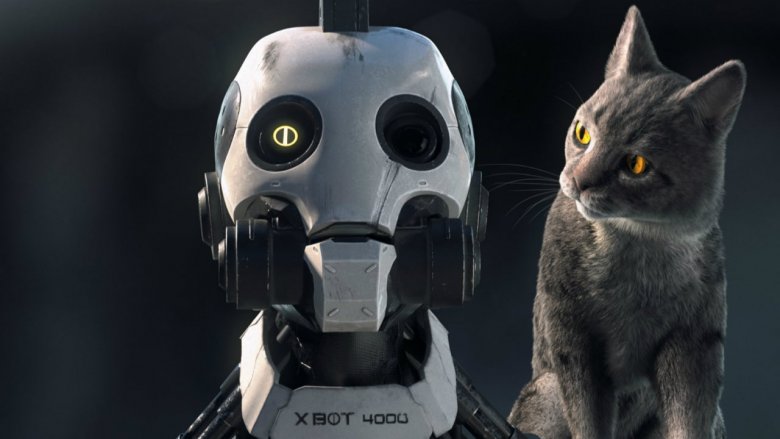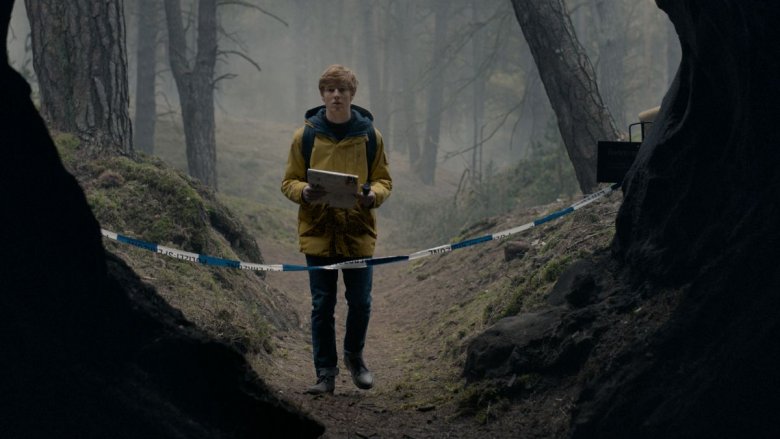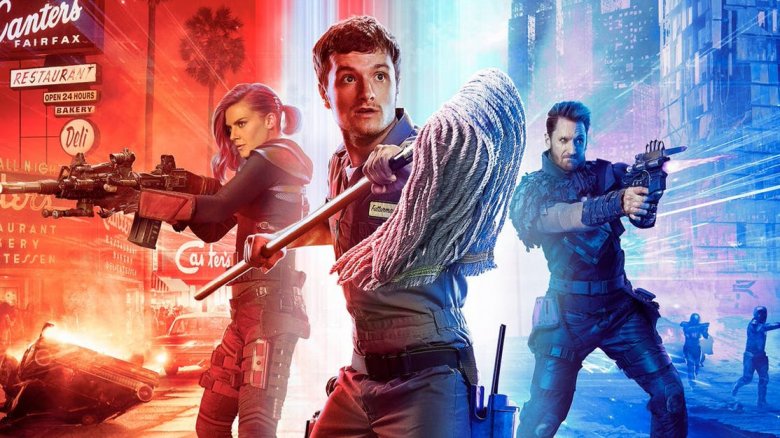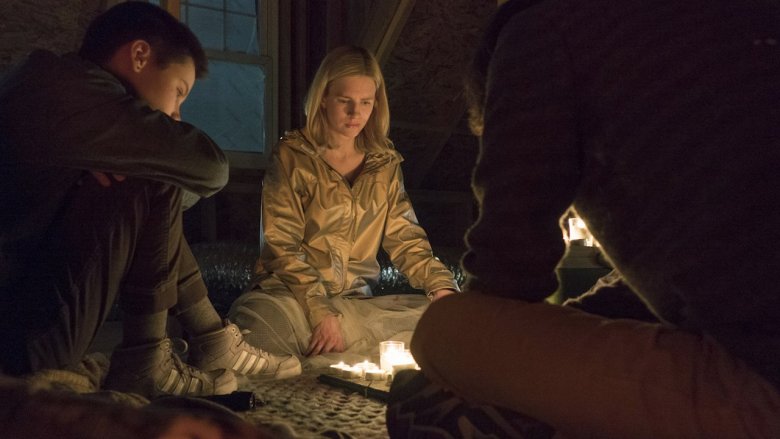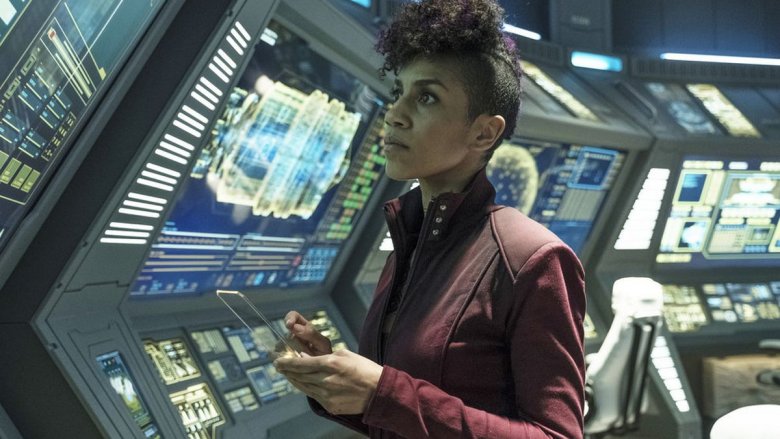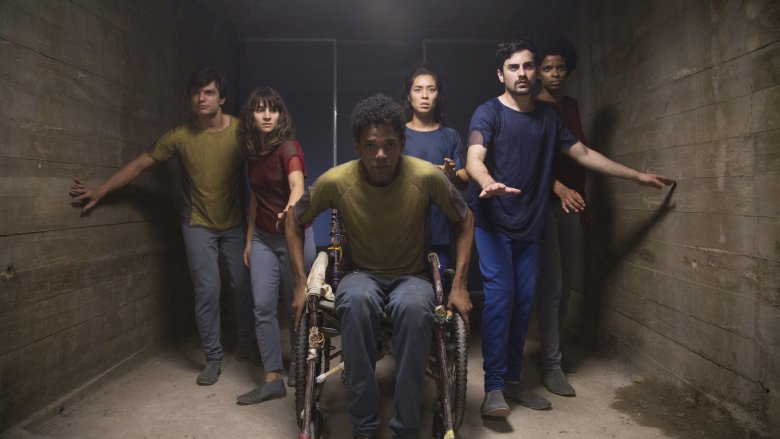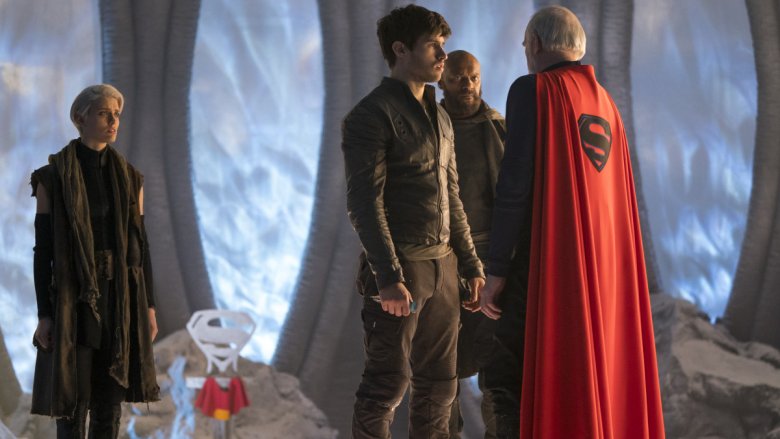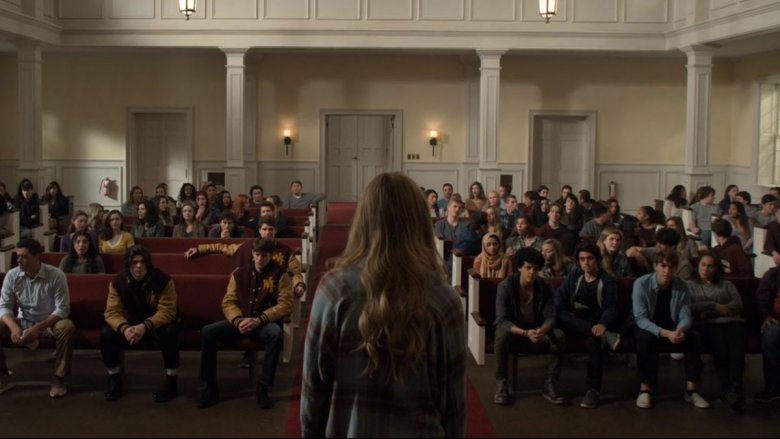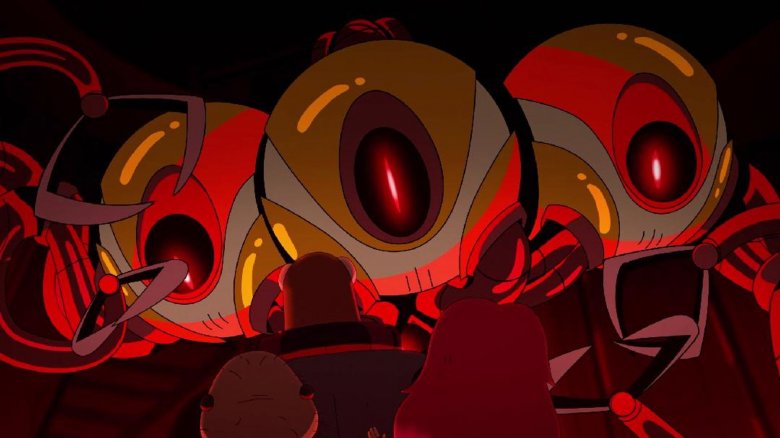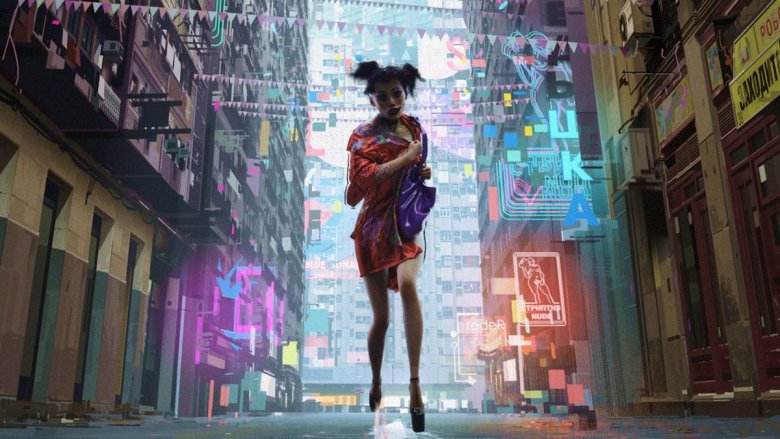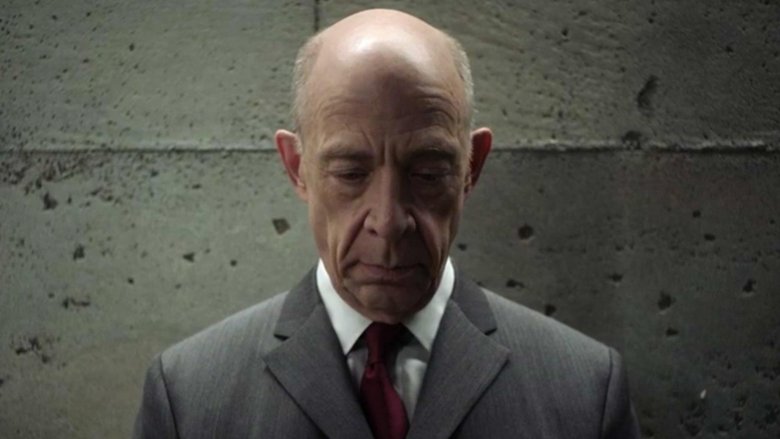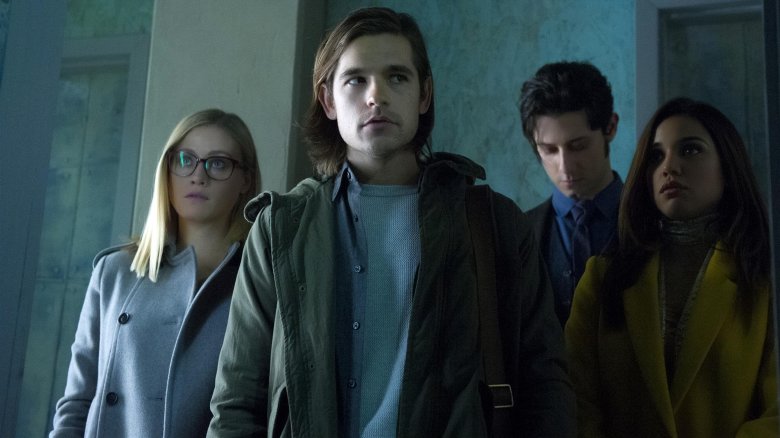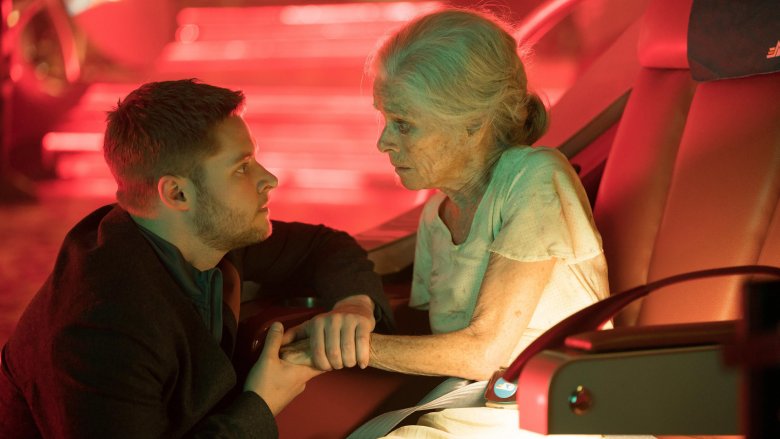The Best Sci-Fi Shows You're Still Not Watching
We may receive a commission on purchases made from links.
In the summer of 2019, the third season of Netflix's sci-fi hit Stranger Things brought in more viewers over its first four days than any other film or series on the platform. Shows like Black Mirror, a sci-fi anthology series about our relationship with modern technology, have become critical and commercial hits, masterfully walking the line between terror and dystopian philosophy. Science fiction is no longer a genre relegated to fans of '60s space exploration and time travel. It's clear these days that audiences are more than willing to escape into parallel universes and Upside Downs.
But these are the shows you know. Stranger Things, Black Mirror, the new Outer Limits. Mention one and you'll be hard pressed to find someone who doesn't have at least a passing familiarity with them. That's great, but what about the shows that don't get all the press, the fanfare, or the official Hot Topic line? When the world of science fiction is endless, there's no shortage of new stories to tell. And sometimes, the best sci-fi stories on television are the ones you've probably never even heard of.
Dark delivers on time travel drama
Dark is a sci-fi thriller out of Germany that released its entire second season onto Netflix in 2019. The series is set in a small town where strange, supernatural occurrences have laid bare the secrets hiding in several families' closets. There's adultery, kidnapping, and murder, and it's all set against the backdrop of time travel. Dark is a slow burn, and it's at times incredibly confusing, but its payoff is worth every second of the ride.
Series creators Jantje Friese and Baran bo Odar told IndieWire in June 2019 that they were worried audiences wouldn't get it at first. "We weren't 100 percent convinced that we would get people [away] from the second screen and actually take the time and investment to watch what's going on," Friese told the publication. The duo was interested in telling a story more focused on human relationships than anything else, so while the physics of Dark's time travel can sometimes be a little hard to follow, the impact of the larger story is going to keep you invested.
Future Man is the most hilarious hero's quest you'll find on TV
The premise of Future Man sounds a lot like something that would have been featured in a 1960s TV show — an underachieving janitor travels back in time to save the world. But in the hands of Seth Rogen and Evan Goldberg, the duo responsible for Superbad, Pineapple Express, and This Is the End, what starts out as a simple enough time travel comedy turns into an irreverent, star-studded misadventure that pays homage to our greatest sci-fi films and filmmakers.
In spite of its second season receiving a 100% Fresh rating on Rotten Tomatoes, Deadline announced in April 2019 that Future Man would call it quits after its third season on Hulu. The decision to pull the plug at the height of a show's run seems to be pretty commonplace these days. According to Deadline, shows on streaming services tend to become less cost-effective around their third season — the payout to series writers and producers gets higher, while audience growth tends to stall.
Whatever the reason behind Future Man's cancelation may be, it's guaranteed to go out with a bang (and maybe wind up actually saving the world in the process).
The OA explores the mysteries of parallel dimensions
When Brit Marling created The OA for Netflix, she already had three feature films under her writing belt, two of which were in the sci-fi genre. But The OA — which centers on a young woman who reappears after having been kept in captivity for seven years, and who has the ability to travel through parallel dimensions — feels like nothing else that's come before it.
It's also been packed with surprises. From spending its entire first season casting doubt on its main character's mental state to throwing a huge curveball at the end of its sophomore run, The OA has taken nearly every twist and turn a proper science fiction series can. Jason Isaacs, who plays Dr. "Hap" Percy, told IndieWire in 2019 that Marling and her long-time collaborator Zal Batmanglij planned out details going as far into the future as Season 5. "There are some shows on the air, where they're implying there's a big puzzle or mythology, and they're gradually revealing it piece by piece. But those people inside the business know full well that the writers are just winging it," he said. "Whereas Zal and Brit, they've got the whole puzzle in their head."
Unfortunately, the rest of that puzzle won't be pieced together on Netflix — the streaming service opted to end its involvement with the series after its second season — but one never knows when or where a show might resurface these days, and either way, The OA is well worth a watch.
The Expanse deals in intergalactic intrigue
The Expanse enjoyed three full seasons on Syfy before the network — known for its creative and original series lineup — announced it wouldn't be moving forward any further. It was an unfortunate turn of events for fans of the show, which is based on a series of novels by James S. A. Corey and follows a group of future antiheroes in a space-colonized world on the verge of war.
Often compared to Battlestar Galactica, The Expanse is a sort of space opera that not only delivers a compelling story but benefits from special effects that don't feel like they belong on a cable TV station. It's also one of the highest-rated sci-fi series on TV, receiving a 100% Fresh Rotten Tomatoes rating for its third season.
Luckily, if you haven't had the chance to get into The Expanse yet, Amazon is giving the show a second life. The company's streaming service picked up the show in mid-2018, following a fan-fueled #SaveTheExpanse social media campaign. Season 4 will be available on Prime Video December 2019.
Get to the other side with 3%
Netflix took another international gamble in 2016 with 3%, its first Brazilian series, directed by City of God cinematographer Cesar Charlone. It's set in a dystopian future where society has been separated into two groups: one of abundance and one of scarcity. In order to make the passage from one side to the other, candidates are forced through a cruel selection process, wherein only 3% are successful.
The series draws parallels to other sci-fi teen dramas (think The Hunger Games franchise), but it sets itself apart both through its storytelling, for which you can thank Pedro Aguilera, and its commitment to character development. Its third season was released on the streaming platform in June 2019, which means there's no shortage of twists and turns to delve into. Given the fate shared by so many other streaming series after three seasons, it also means that this is in all likelihood the last chance you'll have to get into 3% before it's put to bed once and for all.
Krypton is for more than Superman fans
Fans of DC's Superman will likely find every reason to enjoy Syfy's prequel series Krypton, which is set two generations prior to the destruction of the Man of Steel's home planet. Instead of Kal-El, the focus here is on Seg-El, his grandfather, and on the choices he must make in order to ensure his grandson's future survival. It's an interesting perspective, because comics enthusiasts already know how the story turns out. But Syfy has found a way to deliver a solid backbone with enough surprises to keep even the most hardcore Superman fans invested.
Coming into its second season, the series started introducing DC fan favorite characters into the mix, including Lobo, an intergalactic bounty hunter in the same vein as Marvel's Wolverine or Punisher. Krypton executive producer Cameron Welsh told Entertainment Weekly in June 2019 that while the show's first season was focused primarily on world-building, season 2 would allow for more expansion. And while season 1 sort of flew under the radar with critics, the series' second season seems to have officially found its stride.
Teens must rebuild in The Society
In Netflix's The Society, a group of teens return to their hometown to discover it's been mysteriously dropped into the middle of nowhere — no internet, no outside resources, and no adults. It's the streaming service's updated version of Lord of the Flies, and it is every bit as addictive and compelling as its source material.
There's something about being forced into survival that will always appeal to a sci-fi audience, and when that survival is dependent on a group of teenagers, the stakes become especially high. Throw in the fact that technology no longer exists, and now these teens — who have no sense of a world without cellphones and computers — not only have to adapt, but they have to grow up far faster than anyone should. The Society says as much about humanity as it does technology.
Season 1 of The Society ended in a huge cliffhanger, but luckily, Netflix has renewed the series for a second run, meaning all those unanswered questions will likely find answers (and generate a slew of new questions for us to ponder).
Final Space is an animated sci-fi adventure for adults
In the world of animated adult sci-fi comedies, Rick and Morty tends to be the one that always comes to mind. But Rick and Morty is a fickle beast, with an unpredictable season structure. Enter Final Space, another animated adult sci-fi comedy airing on Adult Swim, and the answer to all those Rick and Morty fans who hate the idea of waiting two years for a block of new episodes.
In spite of its surface similarities to the Justin Roiland and Dan Harmon series, Final Space is a show all its own, from the creative mind of Olan Rogers with the help of David Sacks and Conan O'Brien. It's centered on the space adventures of Gary Godspeed and his planet-destroying alien friend, Mooncake, along with a rag-tag group of intergalactic characters ranging from a cat-like bounty hunter to a Deep Space Insanity Avoidance Robot Companion voiced by Fred Armisen. Its lighthearted tone balances an often thoughtful story, and while it may take a few episodes to figure things out, it's worth it to see it through.
Love, Death & Robots explores adult themes through stunning animation
Boasting the tagline, "Short, sweet, and lethal," Netflix's Love, Death & Robots delivers on all three counts, making it one of the streaming giant's most bingeable series ever (and that's saying something). Love, Death & Robots is an animated anthology series made up of 5-15 minute episodes that feature work from various writers, directors, and animators. It's heavy on violence, gore, and NSFW-centered content, and although some installments fail to live up to others, as a whole, it's incredible to watch.
In June 2019, Netflix announced that it would renew the series for a second season, which means nearly 20 more episodes from countless more creative figures in the industry. If there's one thing the show does well over anything else, it's shine a light on Hollywood's current talent. David Fincher, who serves as executive producer for Mindhunter, another one of Netflix's highly acclaimed series, is responsible for bringing Love, Death & Robots to the small screen.
Counterpart is equal parts science fiction and political intrigue
J.K. Simmons leads the cast in this espionage series with a parallel universe twist. Simmons plays dual versions of the same character, an employee at a Berlin-based United Nations spy agency that houses a passageway into a parallel dimension. Part Fringe, part The Americans, Counterpart is a sci-fi spy thriller that can count its success on Simmons' outstanding ability to portray two separate and nuanced roles.
After two successful seasons — both carry a perfect Fresh rating on Rotten Tomatoes — Starz announced that it wouldn't be giving Counterpart a third season. But with the help of a vocal (albeit small) fanbase, the show was quickly shopped to various streaming platforms in the hope that it will see a revival of sorts. Series creator Justin Marks took to Twitter in February 2019 to thank the show's fans and express his hope that it would get picked up, saying (via Deadline), "Fingers crossed that our wonderful studio, MRC, can find a way to keep the dream alive!"
The Magicians takes an adult approach to fantasy literature
Imagine if The Chronicles of Narnia and Harry Potter were written for adults. The result would be Syfy's The Magicians, an intelligent, hilarious, and remarkably relevant series that deals with complex themes while lobbing pop culture references at its audience at every turn. It's from the creative mind of Sera Gamble, who spent over a decade on the CW's Supernatural, if that gives any indication of the show's overall tone. But The Magicians deals in adult content, and it does so in a way that's conscious and inclusive, while also throwing in the occasional epic magic battle.
Entering into its fifth season, The Magicians' showrunners argued that having no idea where to go with a story is generally the best way to approach it. In an April 2019 interview with Entertainment Weekly, co-showrunner Henry Alonso Myers said, "The only way to make sure the audience is surprised is that we're surprised," explaining that they typically write themselves into a corner at the end of each season just to challenge themselves to get out of it. Here's to many years of incredible narrative magic acts.
Philip K. Dick's Electric Dreams imagines a not-so-bleak future
Philip K. Dick's Electric Dreams utilizes an approach to anthology storytelling similar to Black Mirror. Where the Amazon series differs, however, is in its more optimistic outlook on the future. Drawing from various short stories by the man who created Blade Runner and The Man in the High Castle, Electric Dreams doesn't believe the future is without hope. And while it may feel a little uneven at times, overall the show is a success, brought to life by a phenomenal cast.
What Electric Dreams truly excels in, however, is its world-building. With stories that span vastly different time periods, the series creates extraordinarily diverse settings that explore technology in wildly different ways. Julie Berghoff, the show's production designer, told Deadline in June 2018 that her approach to Electric Dream's visual style came down to a combination of researching classic architecture and imagining the future of current tech companies. The result is modern, but also tangible. Electric Dreams feels like a reality that could actually happen, and it isn't a bad thing.
